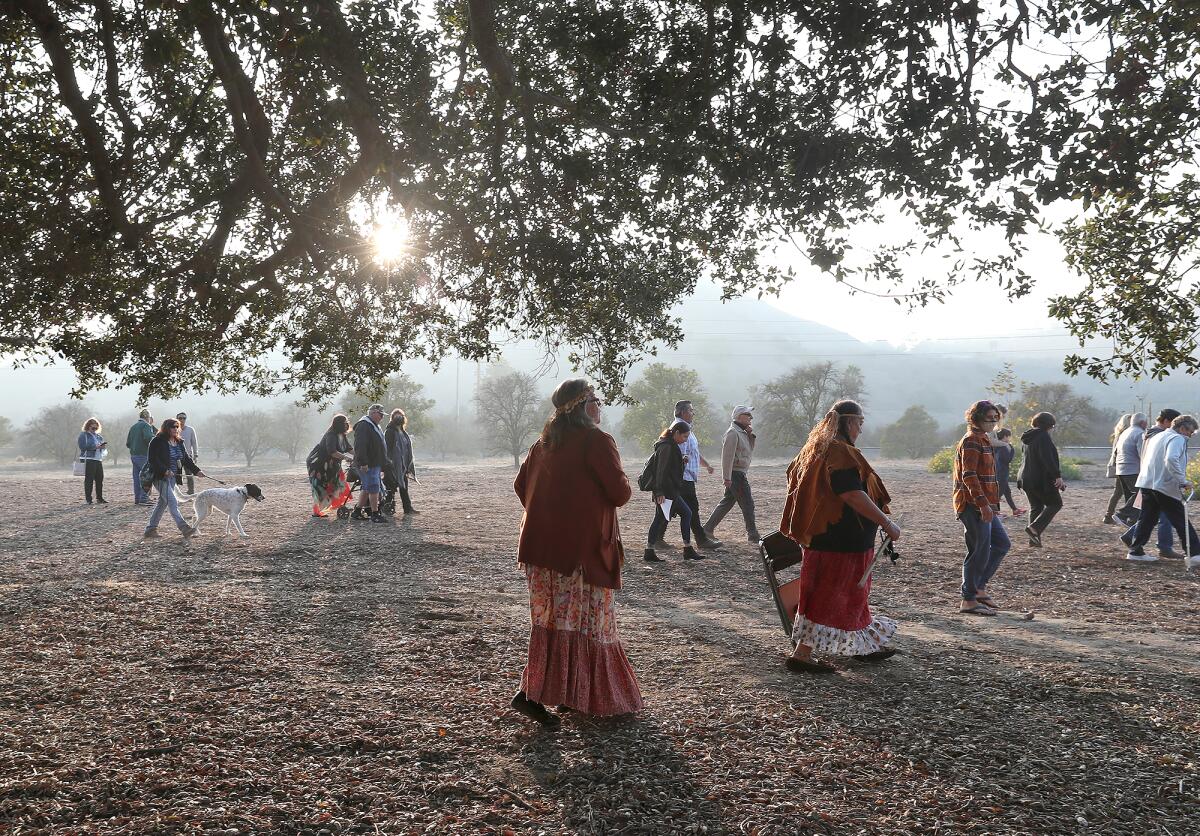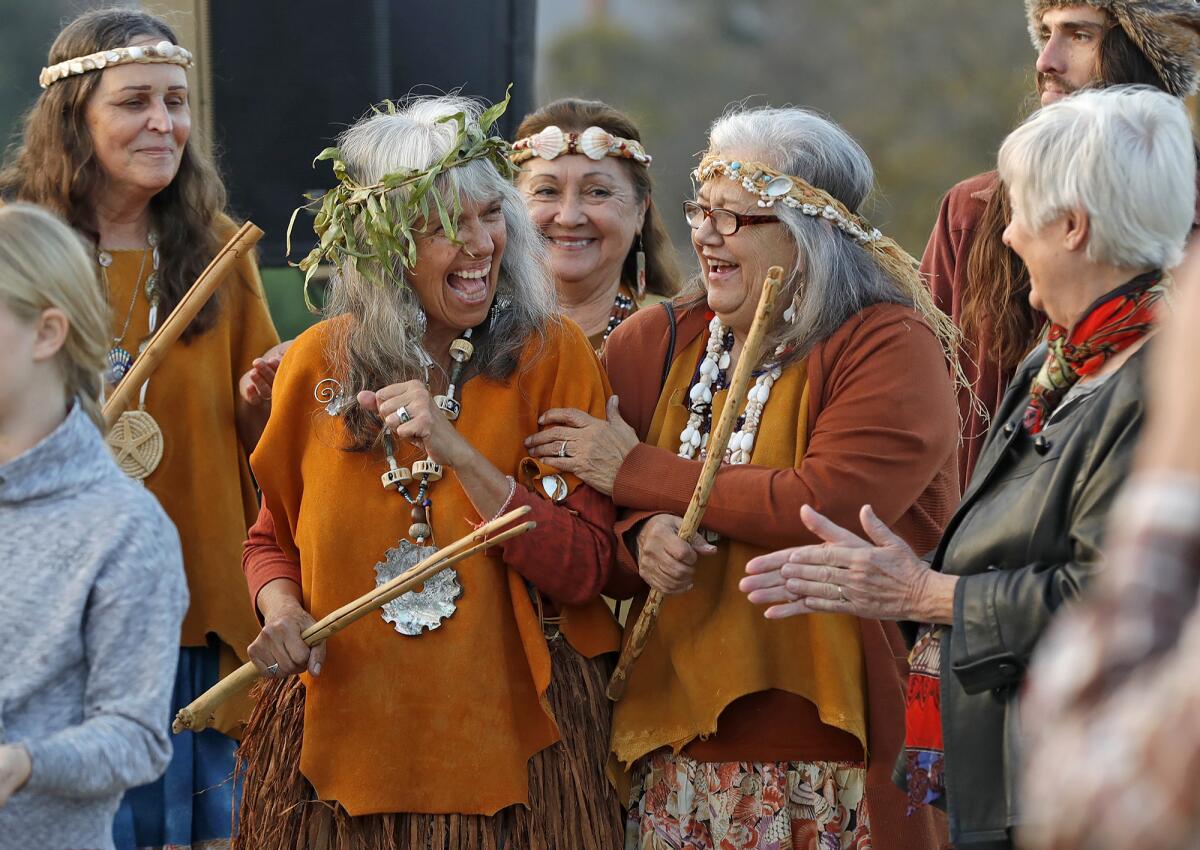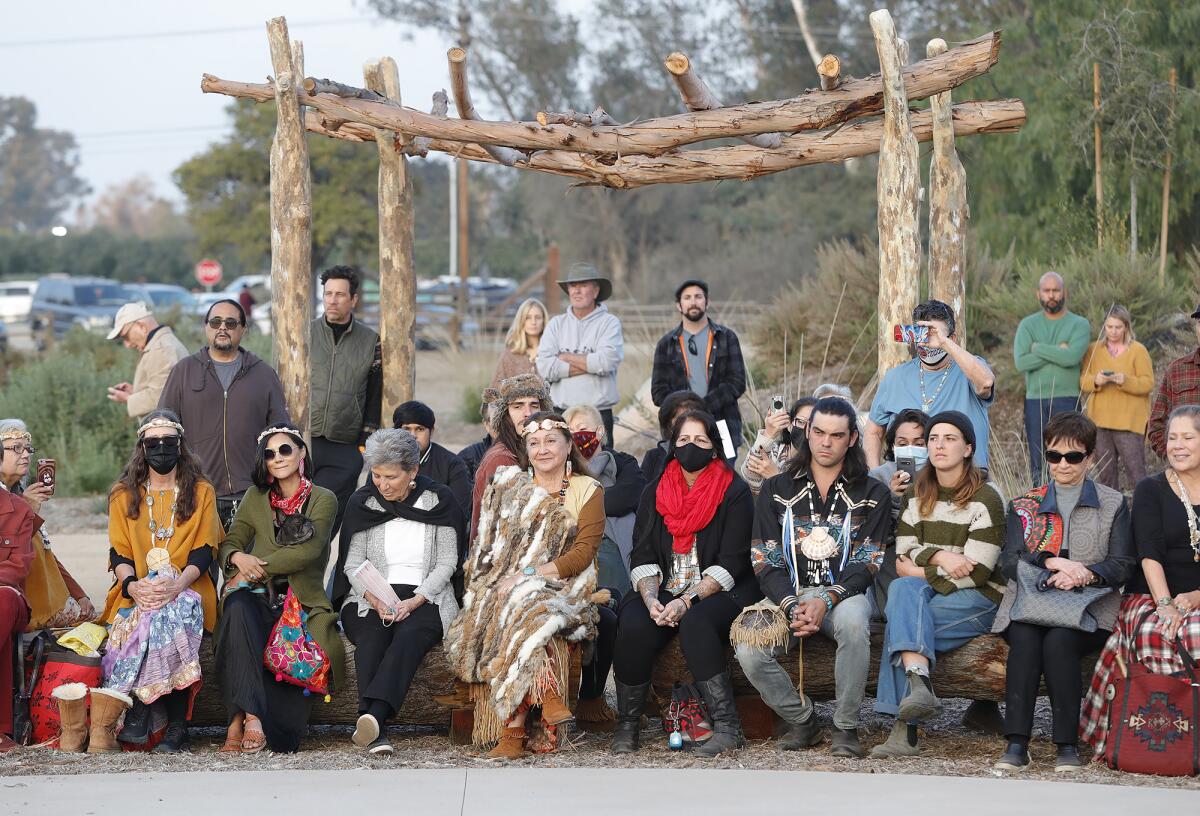First people of O.C. fight development proposals on the land of their ‘mother village’

Members of the local Native American community are hoping to preserve the land of an ancient village in San Juan Capistrano while the city is considering several developments on the space.
The Northwest Open Space served as the “mother village” for the Juaneño Band of Mission Indians hundreds of years ago. But in the near future, the 65-acre property could include a farm, barns, equestrian center, orchards or trails. These amenities are a part of the three development proposals that the City Council is currently considering for the land.
Though the City Council appears intent on moving forward with development on the land, tribal leaders and conservation groups are hoping to put a stop to the projects.
Juaneño tribal member Rebecca Robles said over the phone Wednesday the projects would alter the land in a way that would disrupt the “natural state” of the site. She said that so many of the tribe’s sites have been impacted by development that it’s crucial to preserve land that she compares to Rome, Mecca or a church. The land of the Acjachemen descendants, whose history traces thousands of years, have had their sacred sites and lands plundered, desecrated and devoured by development. The tribe, which has about 1,900 members, became known as the Juaneños after Spanish colonialists built Mission San Juan Capistrano in 1776.
“So much has been lost,” Robles said. “These sacred sites are very, very important for us to go back and connect with our history, teach our children and be spiritually complete.”
Currently, there is a 1.5-acre park in the Northwest Open Space that is dedicated to the Juaneño. The Putuidem Village park opened last year after tribal members fought for decades for a place to hold ceremonies and educate the public about tribal history.
Robles is in favor of expanding the park instead of moving forward with the development projects.
“As San Juan Capistrano becomes more and more developed, the remaining open space becomes more and more precious,” she said, adding that she wants the park to be expanded “as a natural site for the community, not just for the Acjachemen people.”

Development has been proposed on the land before. In 2019, a glamping and camping business was being considered for the Northwest Open Space, though residents opposed it, claiming at the time that the development goes against the language of Measure D, which voters passed in 1990 in order to use bond funds to “acquire lands for park, agriculture, open space, and related uses, in order to save these lands from potential residential and commercial development and to develop youth, senior and other community facilities.”
In late February, tribal leaders and local conservation groups sent a letter to San Juan Capistrano city officials, urging them to preserve the land. Organizations that signed onto the letter included Banning Ranch Conservancy, Preserve Orange County, Save Laguna Canyon, California Cultural Resource Preservation Alliance, Endangered Habitats League, United Coalition to Protect Panhe, Saddleback Canyons Conservancy and Friends of Harbors, Beaches, and Parks, among others.
Several groups sent letters to the City Council prior to its meeting Tuesday, taking issue with the proposed development projects.
“Scientific studies have shown that providing open natural spaces for people to get outdoors results in long term physical and mental health benefits,” wrote Sharon Lee Koch of the local Sierra Club chapter. “Natural open spaces must be easily accessible to everyone, not just those attending private events. Protections for lands and waters must be enduring. These protected areas must also be managed so that biodiversity and the ecosystems they rely upon continue to thrive in the face of climate change. Protection of lands and waters must build on meaningful consultation with California’s tribes and support Tribes’ efforts to care for their lands.
“In addition to providing increasingly rare open space for the general public and wildlife, the 65-acre NW Open Space is archaeologically and culturally sensitive and we are opposed to any project that will cause ground disturbance to this significant cultural resource. It is important to note that the Putuidem Park Village was planned and constructed to avoid ground disturbance.”
Puvunga Wetlands Protectors, a nonprofit working to preserve sacred sites of the Tongva and Acjachemen, also came out in support of preserving the land.
“Do not destroy known archaeological sites as these hold tribal historic information that provides contemporary tribal and community members an opportunity to connect with the land and each other,” wrote Anna Christensen and Tahesha Knapp-Christensen of Puvunga Wetlands Protectors. “Do not be overly concerned with money and especially, do not view the NW Open Space as a revenue stream. Doing so will shift your focus and responsibility from preserving what is most precious, maintaining a natural barrier to the ever expanding human footprint of commerce and convenience that is choking the life and health out of your neighbors. Remember your city motto, “‘Preserving the Past to Enhance the Future.’”

During Tuesday’s meeting, each of the developers provided overviews of their proposed projects.
A Capistrano Vineyards proposal includes a restoration of the Swanner House, which is currently a wedding venue, though the license agreement for the property ends in June. The development would also include event and culinary facilities, an equestrian facility, orchards and vineyards, an extensive trail system, picnic areas, community gardens and other recreational amenities like an area to play badminton and horseshoes.
During a presentation at the meeting, Jim Adam, who is proposing the project, said the land is personal to him and his development will have a small business footprint.
“We will also respect the privacy and history of the Acjachemen people,” Adam said. “We know the sensitivity of the Northwest Open Space.”
Another proposal from C&C Development seeks to turn the Swanner House and surrounding area into a “destination event venue.” This will include a refurbishment of the Swanner House and the construction of a barn to host gatherings for hundreds of people. The proposal also calls for a number of landscaping and agricultural improvements, including the addition of a garden and olive tree grove. The property will also provide an entrance to the Putuidem Village, which will be lined with native California vegetation.
The final proposal, from Frontier Real Estate, includes use of the Swanner House, two lawns, a barn and a greenhouse, which would all be used for events. They would be surrounded by an orchard, and a series of trails and meadows would wind throughout the property. The project also calls for a farm that would supply produce for downtown restaurants and an equestrian facility that would host rodeos, roping and barrel racing.
Following the presentations, the council directed city staff to further analyze the proposals and return at a future council meeting. Mayor Derek Reeve noted that the council will have the option to decide that there shouldn’t be any development on the property.
“However, the council I think has been clear that we really are interested in utilizing the assets we have to allow more residents to enjoy it and have access to it,” Reeve said.
All the latest on Orange County from Orange County.
Get our free TimesOC newsletter.
You may occasionally receive promotional content from the Daily Pilot.




